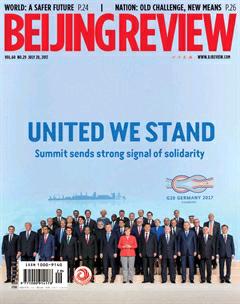CHANGE GEAR!
By+Yu+Lintao
Amid hard bargaining and compromises, the G20 Summit in Hamburg concluded with a joint communiqué issued without the U.S. However, it was still a better-thanexpected result in view of U.S. President Donald Trump firmly holding his “America first” flag. After all, better aught than naught.
In the communiqué, the members reiterated their support for globalization, opposed trade protectionism and committed themselves to open markets. They decided to establish a stable international trade system to promote transnational investment.
The leaders of the member countries and the European Union also agreed on closer cooperation to fight terrorism, fulfill existing anti-terrorist commitments and strengthen information sharing. There was consensus on capping terrorists sources of financing as well as combating terrorist activities using the Internet.
In addition, they launched an initiative to fight poverty in Africa, encouraging privatesector investment, support of infrastructure development and greater economic participation and employment in Africa. The communiqué said the G20 members were ready to help interested African countries and called on other partners to join the initiative.
To sum up, the joint communiqué at least showed the world a gesture that the group is willing to work together to deal with the common challenges to global development.
But what should also be noted is that though the members voiced support for globalization and free trade, it was the first time the G20 communiqué had decided that “legitimate trade defense instruments” can be used by the members if they are being taken advantage of by their trading partners. The statement is an apparent compromise in response to the concerns raised by Trump, who has been arguing that trade must be fair and open and benefit American companies and workers. Such a compromise has the potential to undermine free trade. It cannot be ruled out that certain measures could be applied to disguise a countrys trade protectionist intention.
Whats more, there are still differing camps within the G20 with regard to climate change, and the divide is hard to bridge. The communiqué acknowledged Trumps withdrawal from the Paris deal, while the other 19 members agreed that the accord is irreversible and they remain committed to it. Many G20 leaders have directly expressed their dissatisfaction with the U.S. move.
The different tone the United States set at the summit shows the severe challenges the G20 mechanism faces in global governance. Though the U.S. stands in the minority, the difficulty cannot be underestimated, as it is the worlds number one economy and most powerful country.
The G20, established in 1999, is a forum in which the international community places high hopes for resolving global development issues. After the end of the Cold War in the early 1990s, the international economic order was dominated by Western developed countries represented by the Group of Seven (G7). But with the outbreak of the global financial crisis as well as the rise of emerging economies such as China and India, the G20 mechanism began to exert influence as a new platform for world economic governance.
In addition to the 20 major economies of the world, the forum has been inviting major international organizations, including the UN, World Bank and World Trade Organization, to participate.
From the G7 to the G20, it is a big step forward for global economic governance, as the G20 has more representation. However, against the backdrop of rising anti-globalization sentiment and populism, the role of the G20 in global governance faces the risk of becoming mediocre.
At a recent seminar on the G20 held by the Chongyang Institute for Financial Studies at Renmin University of China in Beijing, former Chinese Vice Foreign Minister He Yafei pointed out that the G20 has a congenital defect: It is not an international organization and has no enforcement power. Many representatives at Think 20, an umbrella organization of leading think tanks, have the same viewpoint.
However, if the G20, a mechanism representing 80 percent of global GDP, 80 percent of global trade and 80 percent of global resources and consumption, cannot solve global problems, can any other organization do so?
It is a far more complex world today than when the G20 was established. To face the new challenges, the international community needs effective global governance more urgently. Therefore, rather than losing hope in the broadly representative global governance platform, it is time for the international community to innovate and rebuild the G20 mechanism.

